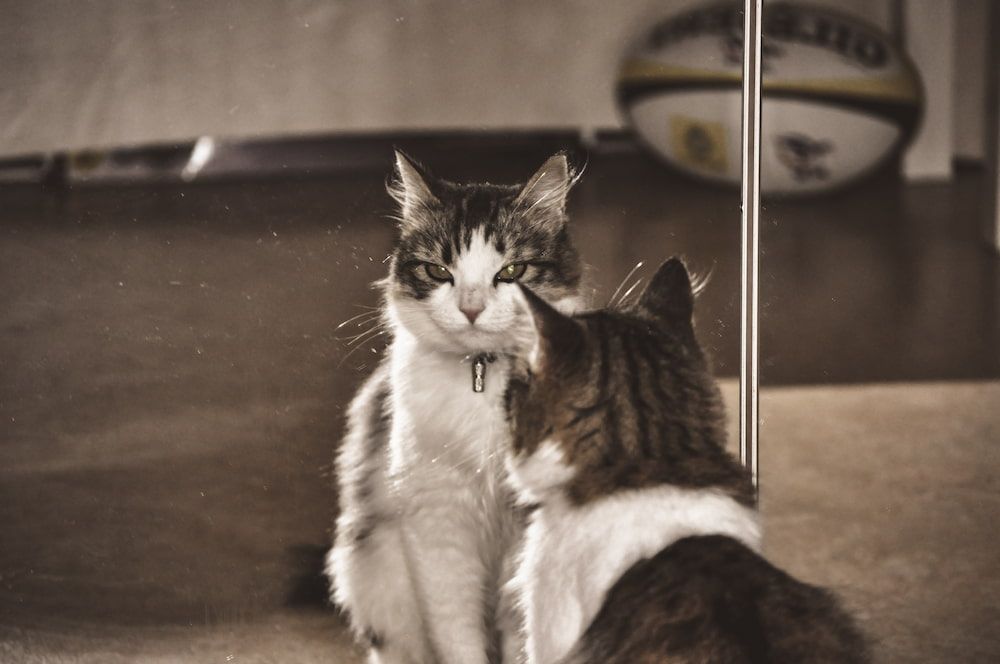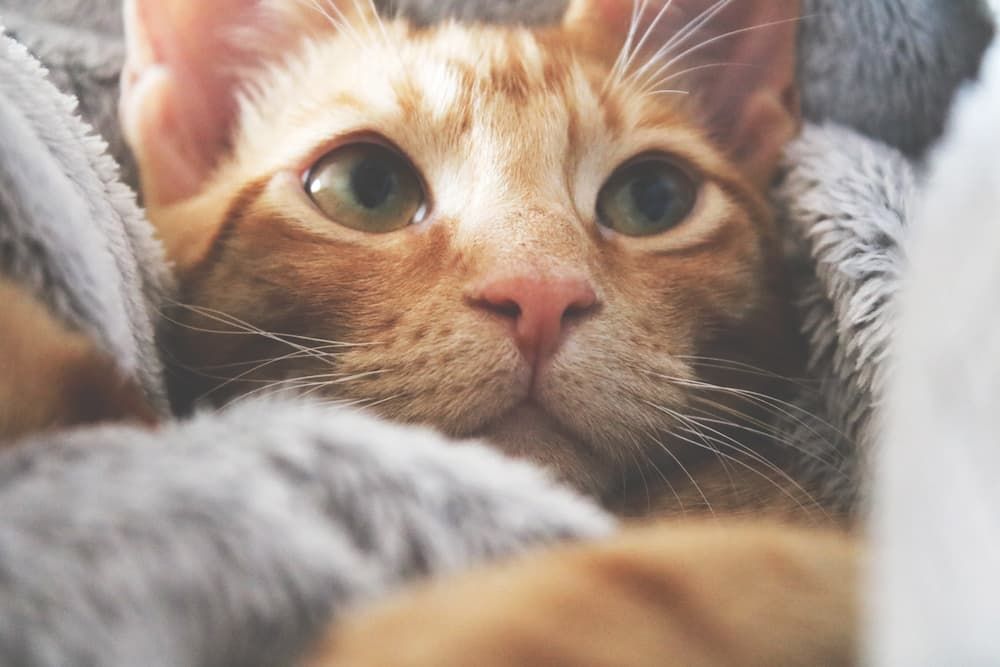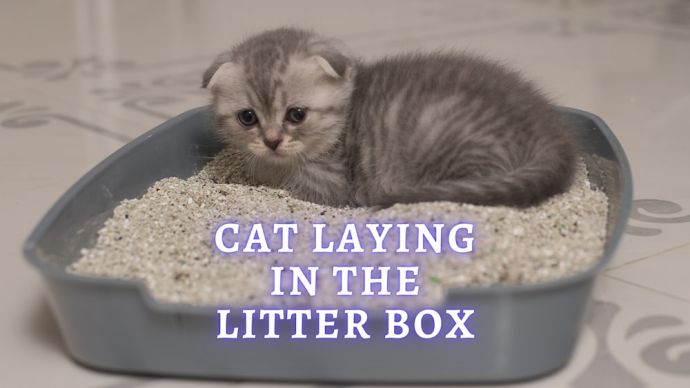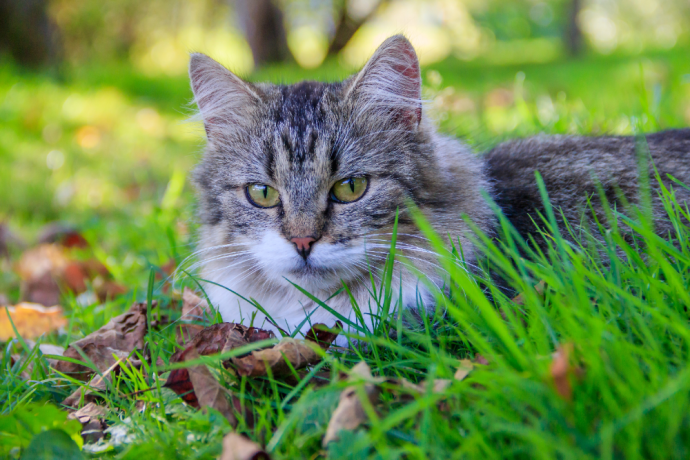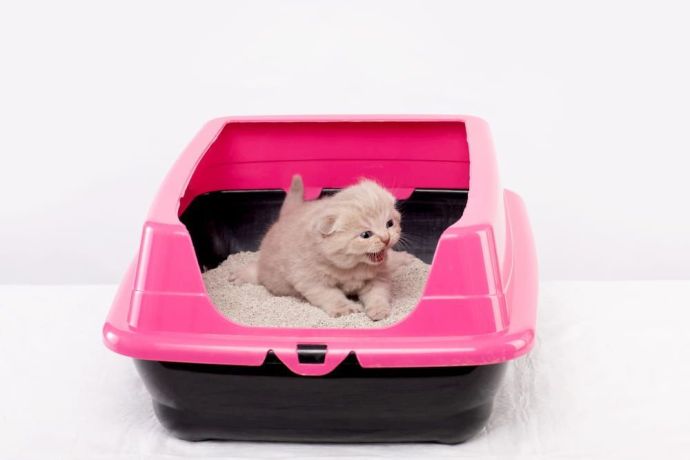Clingy Cat: 8 Reasons Why Is My Cat So Clingy
Written by:
Author: Alina Andreeva
Alina A. is a professional writer, editor, and pet-lover. She has published over 50 articles on how to care for pets properly. Alina has been writing articles for 3 years, so she has considerable experience in this niche. Her natural curiosity helps her to expand her knowledge and learn new pet care life hacks, which will make your life much easier.
View all 79 articlesLearn about our editorial process and veterinary review board.
Viewed: 1159
Updated on: 05/06/2021
Many pet parents prefer cats to dogs. Both animals are aloof, playful and make for great cuddle buddies. However, cats considered are more independent and low maintenance. Contrary to dogs, they don’t care as much for constant petting and playing.
So, you cannot help to wonder why your kitty is so clingy. She follows you everywhere, meows all the time, and scratches at the bathroom door when you leave her outside. So, you are probably asking yourself, “how do I make my cat less needy?”
In most cases, felines craving affection because of boredom or insecurity. However, the clinginess may sometimes point to a more serious, underlying issue.
This article discusses what makes a clingy cat and how to deal with it to increase your kitten’s confidence.
Why Clingy Occurs in Cats?
Studies reveal that 89% of cats express fear-related behavior [1] which their pet parents would like to change. In many cases, they beg for food, attention, and excessive affection. A few felines even show signs of aggression and destructiveness. Fortunately, clinginess in cats can be unlearned as soon as you discover what causes it.
Your cat may be clingy for a variety of reasons. Keep in mind that you should handle her differently depending on the cause. Here are the most common reasons clingy behavior in felines:
1. New environment
Clinginess in cats often occurs when you take them to a new household. For example, if you change homes or you stay with a friend over the weekend. In these cases, your cat may feel insecure and scared. As a result, she will crave your attention at all times. More so, you may find that leaving her alone is almost impossible even for just a few minutes.
2. Don trust other household members
Very often, cats look at their owners as their natural parents. This confusion is primarily present in rescued or abused kitties. If your pet is one of them, she may become extra clingy when there are new people in your household.
For example, she may distrust your roommates, friends, or new partners. When it is possible, she will seek your motherly attention to feel safe around others.
3. Victim of past abuse
When adopting a kitten with a rough past, you must prepare for her excess clinginess. As soon as you earn her trust, the cat will seek your attention and care with dizzying neediness.
4. Early weaning from mother
Many of the kittens in animal shelters have been deprived of their mothers’ care too early. As a result, they developed anxiety and separation issues. If your cat is one of them, she will often crave more attention than usual when you leave her alone.
READ MORE: When to Wean a Kitten From Their Mother?
5. Your cat has been separated too soon from her littermates
Kittens have to stay together with their littermates and mother for the first 8 weeks of their lives. This way, they will develop emotional independence and self-esteem. Otherwise, they will grow to be anxious, especially when left alone.
If your cat has been removed from her brothers and sisters too soon, she will be extra clingy for your attention.
6. Your cat has a fixed attitude
Many times, a cat is clingy because that’s what she learned to be acceptable behavior. For instance, when you adopt an older feline, you may find that she is over-the-top needy. It could be that the previous parents taught her to be that way. Even more, they might have rewarded her with treats every time she was clingy. So, your kitty may think that by asking for immediate affection, she will receive a reward.
7. Boredom
Many pet parents come back home after a full day of work to find their cats extremely clingy. If that is your case, it shouldn’t come as a surprise. Simply put, being alone and napping all day has bored your cat out of her mind. So, it is up to you to make up for ten hours of affection deprivation.
READ MORE: Do Cats Get Bored?
8. Sickness
When humans get sick, they often feel vulnerable and craving for familiar comfort. So, why should it be any different for cats? If your kitten becomes needy without any obvious reason, you should take into account her being sick. An underlying medical illness may result in cats turning unusually clingy.
What to Do if Your Cat Became Suddenly Clingy?
As you can see, your cat may suddenly become needy for various reasons. You must identify the cause of her clinginess before you take any measure. Otherwise, you may do more harm than good to both your kitten and to your relationship with her.
Let’s look at how you can stop your cat from being clingy in particular situations!
New Surroundings
If your cat feels insecure in a new environment, she will want to stay glued to your arms. However, it doesn’t have to be that way. As long as you keep her close, she will feel safe enough for the neediness to decrease.
Place your cat in her favorite basket or bed near to you. It can be on the couch, on the bed, or on your work desk. This way, she will feel secure and not ask you for constant petting.
New People
To reduce clinginess, you need to make them feel comfortable in social situations. If you share a flat, leave your cat with your roommates frequently. If you live alone, invite your friends and family to stay with your kitten when you’re not there.
This simple trick will make your cat less clingy when new people are around. She will fear them less and not depend only on you for attention.
Stressful Environment
Even if your cat has been living in the same house all her life, she can still be stressed. For example, outdoor noises of fireworks and thunder can increase anxiety. The same goes for cars, birds, and other pets that she may see outside your windows. In these cases, she will stay close to your body to feel safe and protected.
To reduce clinginess, you should expose your cat to different environments. Do this at a slow pace but frequently. For starters, you can take her outside in the yard. Keep her in a box or have her on a leash to keep her safe. This way, she can explore the surroundings of her home and feel less anxious when being back inside.
When your cat feels more confident, take her for short walks around the neighborhood. Finally, you can take her in carry-on backpacks on long travels and even in the great outdoors.
Past Abuse
A newly adopted kitty will feel scared and insecure when you are not around. More so, she will engage in bad behavior if she feels abandoned when you are out.
Leave plenty of toys around when leaving for work. They will not replace your presence completely. Still, they will distract her from being scared or destructive until you get back home.
Lastly, you shouldn’t make a big fuss when leaving the house. By storming out, you increase her anxiety. The same goes for when you return. Keep your entrances and exits low-key and as quiet as possible.
Boredom
Sometimes, your cat may be needy simply because she is bored. In this case, do not encourage negative behaviors. If she jumps on the table, calmly take her down. Also, if she bites, scold her in a calm but assertive tone.
Chances are that your cat will repeat these behaviors. However, you can discourage them with swift disapproval.
To reduce boredom and, subsequently, anxiety, you should schedule playtime sessions regularly. Just like daily meals and litter box cleaning, these interactive activities should take place at similar times every day.
Preferably, you should have an evening ritual of play and cuddles at least five days a week. This way, your kitten will steadily develop a preference for when to play and when to slack around.
READ MORE: Best Cat Toys
Cognitive Dysfunction
As they age, cats tend to suffer various cognitive dysfunctions. For example, they may foster vision loss, hearing problems, and issues with their balance and coordination. As a result, you may often find your cat bumping into furniture or walking shyly across the room.
Your senior kitty may be clingy because she relies on you for guidance. While she may also lack attention, she feels more vulnerable because of her cognitive issues.
In this case, you should reduce unnecessary stimulants in your home. For example, try not to make sudden moves or loud noises when the cat is around. Also, if you have guests over, keep her in a quiet room away from the stressful crowd.
Health Problems
If you have eliminated all the reasons above, and your cat is still excessively clingy, she might be dealing with underlying medical problems.
In this case, your cat is clingy because she is looking for help. It could be that she has a sore paw or an internal infection. Regardless, she is in pain and trusts you to alleviate it.
Your best choice is to visit the vet as soon as possible. This way, you can identify any medical issues and prevent them from exacerbating and risking your kitten’s life.
How to Prevent Your Cat from Becoming Clingy
The best cure for any problem is prevention. So, if you want your cat to be less needy, you should try to anticipate her anxiety and trust issues. Simply put, a confident and entertained cat is less likely to become clingy.
Here’s what to do with a needy feline:
- Do not show irritation or aggression even if your cat is excessively clingy. If you fail to stay calm, your cat will become even more insecure and scared.
- Do not give her treats right away. Keep in mind, that your cat is unlikely to be hungry. However, if you feed her, she will start to believe that being clingy is rewarding.
- Only reward your cat with treats when she stops being clingy. This way, her behavior should gain more balance in the long term.
- Always give her a bit of attention, even when you are busy. For instance, you can pet her while talking on the phone. Also, you can talk to her while cooking or cleaning around the house. If you are working, take a few seconds to throw a ball to the other side of the room and keep her entertained.
- Look at the problem from the cat’s perspective. Have you been ignoring her? Does she carry emotional baggage from past abuse? Is she healthy or not? Is she just using you to get some treats?
After using these simple guidelines, try to find out more about what is causing your cat to be anxious, and therefore, clingy.
What if It’s Separation Anxiety?
People with separation anxiety disorder feel extreme fear and discomfort when being away from loved ones. In many cases, they experience panic attacks and sadness.
According to this clinical study,[2] cats can also feel separation anxiety. However, they may experience it more when they are extremely clingy and needy with their pet parents. As a result, when you are away, your kitty may feel so insecure that she resorts to destructive behavior.
If your cat is dealing with separation anxiety, the bond that you share may suffer irreparable damage.
Early Signs of Separation Anxiety in Cats
A cat who benefits from regular playtime, affection, and care should show signs of positive obedience towards her owner. As a result, she will rarely engage in destructive behavior.
On the other hand, if your cat is suffering from separation anxiety, will show signs like:
- Inappropriate urination.
- Inappropriate defecation.
- Excessive vocalization.
- Destructiveness.
- Psychogenic grooming.
Most pet parents do not realize the problem when noticing such symptoms of separation anxiety. Moreover, they punish the felines for what they believe are signs of disobedience. As a result, the cat’s anxiety increases even more and her trust in people diminishes.
Dealing with Separation Anxiety in Cats
The quickest way of reducing separation anxiety in your cat is to enhance her living environment. For example, you can add a cat tree, boxes, and stimulating toys to your home. This way, she will have plenty of things to be busy with when you are away.
If the destructive behavior continues, you should consider the services of a pet behavioral therapist. This way, an expert can observe your cat’s actions and behavior, and evaluate her living environment. Next, you will receive suggestions on what to change to improve your kitten’s mental state.
Does My Cat Need Medications for Separation Anxiety?
Cats may find it difficult to overcome separation anxiety even when you enrich their environment or use behavioral therapist services. In these extreme cases, you may want to talk to your veterinarian about medication solutions.
The vet can identify the cat’s problems and prescribe the appropriate treatment. This way, your fuzzy friend should feel less anxious or destructive when you are not around.
READ MORE: Why My Cat Doesn’t Purr?
FAQ
Why is my cat being so clingy all of a sudden?
Your cat may feel insecure about being in a new environment or seeing new people. Alternatively, she may feel bored or craving some treats.
Why is my cat overly attached to me?
Your cat may be dealing with intense stress, pain, or discomfort. So, she is looking to receive affection and care to diminish those feelings.
Why is my cat being so needy?
Your cat may show extreme neediness because of pain and uncertainty. She may be suffering from underlying health issues or separation anxiety. If the problem persists, you should consider a trip to the vet.
Article Sources:
- Goins, Matt. “Veterinary Professionals’ Understanding of Common Feline Behavioural Problems and the Availability of ‘Cat Friendly’ Practices in Ireland.” PubMed Central (PMC), 1 Dec. 2019, ncbi.nlm.nih.gov/pmc/articles/PMC6941078/.
- Schwartz, Stefanie. “Separation Anxiety Syndrome in Cats: 136 Cases (1991-2000).” PubMed, 1 Jan. 2002, pubmed.ncbi.nlm.nih.gov/12420782/.
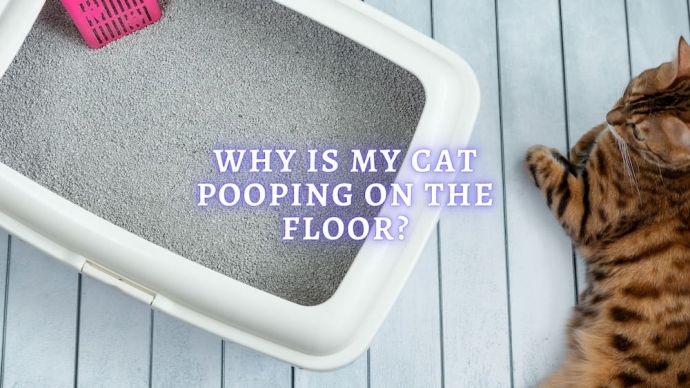 Cat Care Why Is My Cat Pooping on the Floor? How to Stop Cat From Pooping Outside the Litter Box
Cat Care Why Is My Cat Pooping on the Floor? How to Stop Cat From Pooping Outside the Litter Box - 370
- 0
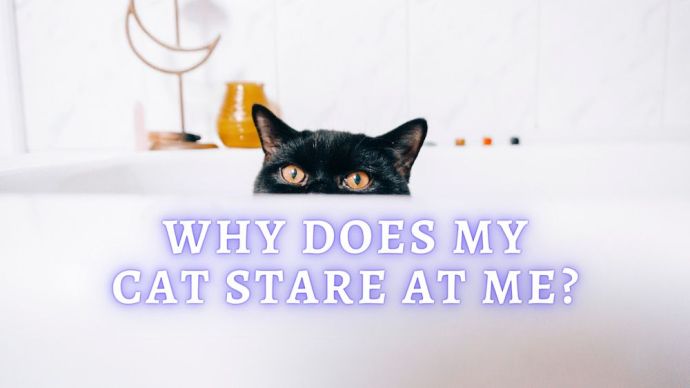 Cat Care Why Does My Cat Stare At Me? Cats Behavior and Body Language Explanation
Cat Care Why Does My Cat Stare At Me? Cats Behavior and Body Language Explanation - 201
- 0
 Cat Care Why Does My Cat Attack My Legs? 10 Reasons Why and What To Do About It (Vet-Approved Advice)
Cat Care Why Does My Cat Attack My Legs? 10 Reasons Why and What To Do About It (Vet-Approved Advice) - 46013
- 21
 Cat Veterinary Tips Cat Stomach Gurgling: Vet Advice on Why is Your Cat Stomach Gurgling?
Cat Veterinary Tips Cat Stomach Gurgling: Vet Advice on Why is Your Cat Stomach Gurgling? - 36469
- 4
 Cat Veterinary Tips My Cat Lost its Voice: Can Cats get Laryngitis? (Vet Advice)
Cat Veterinary Tips My Cat Lost its Voice: Can Cats get Laryngitis? (Vet Advice) - 23554
- 13











